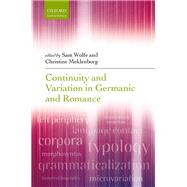- ISBN: 9780198841166 | 0198841167
- Cover: Hardcover
- Copyright: 7/20/2021
Sam Wolfe, Associate Professor of French Linguistics, University of Oxford,Christine Meklenborg, Professor of French Linguistics, University of Oslo
Sam Wolfe is Associate Professor of French Linguistics at the University of Oxford and Tutor and Official Fellow of St Catherine's College, having previously held teaching positions at the universities of Cambridge and Manchester. The principal focus of his current research is a monograph on syntactic change in French, and he has ongoing projects on Venetian and on contact-induced changes in Romance languages. His first book, Verb Second in Medieval Romance, was published by OUP in 2019, and he is the co-editor of the OUP volumes Rethinking Verb Second (with Rebecca Woods; 2020) and Variation and Change in Gallo-Romance Grammar (with Martin Maiden; 2020).
Christine Meklenborg is Professor of French Linguistics at the University of Oslo, Norway. She specializes in Medieval French but in recent years has also been working on medieval Germanic languages, especially Old Swedish. From 2014 to 2019 she was Principal Investigator of the research project 'Traces of History'. She is the editor of A Micro-Perspective on Verb Second in Romance and Germanic (special edition of Linguistic Variation; Benjamins 2019) and, co-editor of Challenging Clitics (with Hans Petter Helland; Benjamins 2013).
List of abbreviations
The contributors
1. Germanic and Romance: Data, method, and theory, Sam Wolfe and Christine Meklenborg
Part I: The Subject System and the Inflectional Layer
2. Register-specific subject omission in English and French and the syntax of coordination, Liliane Haegeman and Elisabeth Stark
3. The position of subjects in Germanic and Romance questions, Anna Cardinaletti
4. Expressing perception in parallel ways: Sentential Small Clauses in German and Romance, Jan Casalicchio
5. Pro-drop in interrogatives across older Germanic and Romance languages, Federica Cognola and George Walkden
6. Reflexive constructions in German, Spanish, and French as a product of cyclic interaction, Matthew L. Maddox and Jonathan E. MacDonald
7. Locative inversion in Germanic and Romance: A conspiracy theory, Benjamin L. Sluckin, Silvio Cruschina, and Fabienne Martin
Part II: Inversion, Discourse Pragmatics, and the Left Periphery
8. V2 and topicalization in Germanic and Romance, Roland Hinterh?lzl
9. Topics in French and Norwegian, Christine Meklenborg, Hans Peter Helland, and Terje Lohndal
10. Issues in the left periphery of Old French and Old English: Topic types and the V2 constraint, Ans van Kemenade and Christine Meklenborg
11. Evaluating the contact hypothesis for Old French word order, Sam Wolfe
12. Second positions: A synchronic analysis and some diachronic consequences, Ian Roberts
13. Deconstructing stylistic fronting in Old Norwegian and Old Spanish, Kristin F?sker Hagemann and Signe Laake
14. The grammaticalization of sic: On narrative particles in Romance and Scandinavian, Verner Egerland
15. Against complementizers, Cecilia Poletto and Emanuela Sanfelici
16. On complementizers and relative pronouns in Germanic vs Romance, Richard S. Kayne
Part III: Continuity and Variation beyond the Clause
17. Adjectival concord in Romance and Germanic, Giuliana Giusti
18. Functional and lexical prepositions across Germanic and Romance, Jacopo Garzonio and Silvia Rossi
19. Locative prepositions in the house, Kersti B?rjars, Nigel Vincent, and Sam Wolfe
20. 'Have' in English and Romance, John Charles Smith
References
Index
The New copy of this book will include any supplemental materials advertised. Please check the title of the book to determine if it should include any access cards, study guides, lab manuals, CDs, etc.
The Used, Rental and eBook copies of this book are not guaranteed to include any supplemental materials. Typically, only the book itself is included. This is true even if the title states it includes any access cards, study guides, lab manuals, CDs, etc.
Digital License
You are licensing a digital product for a set duration. Durations are set forth in the product description, with "Lifetime" typically meaning five (5) years of online access and permanent download to a supported device. All licenses are non-transferable.
More details can be found here.






